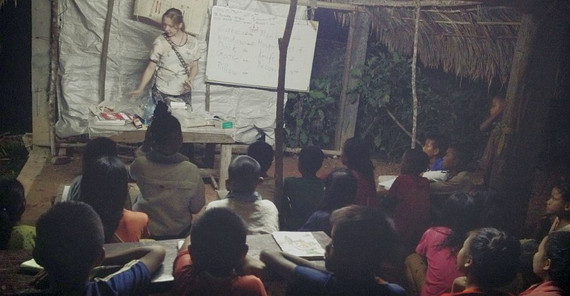Berlin, Frankfurt, Vientiane. I’ve been traveling for 36 hours so far. At the Vientiane airport, eight other volunteers and I are met by our partner organisation Lao Youth Union (LYU). A car takes us to Tha Khaek, where two of us will be working. My journey doesn’t end here, though. I’m headed to Huay Xai, in the Bokeo region, to teach English.
I try catching up on sleep, but a heavy monsoon rain keeps me up. Liter after liter pours onto our heads. Our driver just keeps on going, since such weather is not unusual during the rainy season. The rain stops a couple minutes later, and the sun comes out. All around, everything is green and lavishly overgrown. The next thing I know, I wake up and have lost track of time. Flooded fields flank the street. We reach a small town.
We’re all looking forward to our first Laotian meal: each of us gets a small basket of Khao Niau (sticky rice), which is a staple in Laos. On the table is a plate of green beans, slices of cucumber, leaves, and other vegetables we don’t know as well as hot soup, omelettes, and Láhp, a sort of warm salad made of fish, mint, and hot spices. After our meal, we travel on. It’s almost 1:00 a.m. by the time we reach our guesthouse. After taking a cold shower, we all meet outside and enjoy a chilled Beerlao.
Charlotte and I head to Bokeo: a region in northern Laos once known as the “Golden Triangle” for its many opium plantations. Opium poppy cultivation has been banned and the province more or less fallen into oblivion. Huay Xai, the largest town in Bokeo, is near the border with Thailand, which makes it a popular transit zone for backpackers.
In Huay Xai I teach English at a newly established school with only one classroom. Our students include doctors, teachers, and staff from various state ministries – the local upper class.
Charlotte and I are the first volunteers in Huay Xai and also the only teachers at this school. The language barrier can pose a real challenge: After all, our Laotian is limited, and we teach in English. Once in a while everything comes to a standstill until we find someone to translate the tasks into Laotian. We teach jointly and make our own tests. When the motivation hits rock bottom, for instance on a particularly hot day, we sing songs or play educational games with our students.
Huay Xai is a small town, so it is easy to settle in and establish contacts. MJ, for instance, comes from a Kmu village in Bokeo, some 30 minutes from Huay Xai; he offers trekking and kayaking tours to tourists. What impresses me even more than his business sense is the fact that he’s been teaching English to the village children for two years. He even integrates his tours with his English classes, since tourists do the teaching. MJ hopes the children will be able to pick up the correct pronunciation from these native speakers. When he realizes that I’m also working here as a teacher, he invites me to his village. The English class is held in the open, on a terrace under a bamboo roof. The children are bright, active, and eager to learn. As we go along, children steadily trickle in. Most of them sit on the ground, because there are very few chairs or benches. Nobody owns a textbook.
My mind keeps going back to this lesson. Every day, I hope to be able to give something, be it a translation or a textbook. The motivation of my students inspires me. Maybe you would like to support my work with a small donation?
For more information, please visit: desireforinspiration.wordpress.com/eine-seite/
Text: Katja Wiegand, Translation: Monika Wilke
Online-Editing: Agnes Bressa
Contact Us: onlineredaktionuuni-potsdampde

